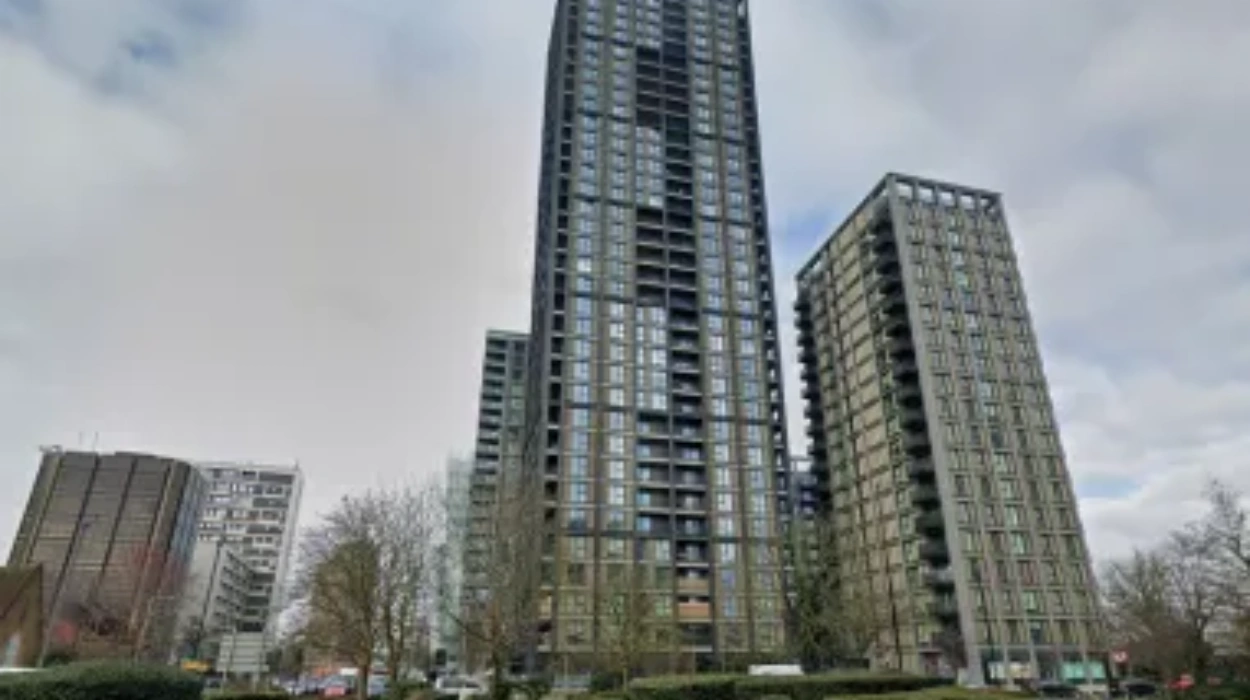Croydon (Parliament Politics Magazine) – Residents of a new Croydon apartment block forced out by damp and mould are urging the council to support their fight for justice and safe living conditions.
Marketed as a luxury development, The Fold has left Croydon residents in a desperate search for alternative residences and requesting municipal assistance in their dispute with Legal & General (L&G), the building’s proprietors.
A one-bedroom apartment in the 251-unit complex, which now costs £1,480 a month, is only 30% occupied after the owners forced a mass evacuation. The Fold was just finished in 2022, but since then, it has struggled with recurring issues like mold, wet, crumbling ceilings, and inadequate communication from Urbanbubble, the management business.
“Every single resident’s story I hear makes me think about how much has been swept under the rug,”
said Jack Fordham, a former Fold resident, who joined a protest outside Croydon Town Hall on Wednesday, October 22, seeking council support.
He told the Local Democracy Reporting Service (LDRS):
“When push comes to shove, we are asking the council for help, and then we can find out who actually stands for us.”
Another resident, Reuben Cox, preparing to relocate elsewhere in Croydon after receiving his notice last month, cited fire safety concerns as his primary worry.
“We tried to get out relatively quickly. I was pretty concerned about what they found regarding fire safety,”
he said.
“What confused me is that they said everyone needs to leave because it’s unsafe, but somehow [their message was also] it’s still okay to stay.”
The Fold has been deemed fundamentally hazardous by several residents because to frequent water damage, crumbling ceilings, and even sewage entering bathrooms.
The LDRS reported in September that the building will need to be demolished to its concrete foundation due to safety issues brought on by the work of the now-defunct builder Henry Construction. All inhabitants must leave by March 2026, and remediation work is anticipated to last until at least 2027.
Residents are now urging the council to use its power to hold L&G responsible in its dual capacities as local government and landowner. Residents voiced their concerns to Deputy Mayor Lynne Hale and Mayor Jason Perry prior to the meeting.
Council representatives inside admitted that they had not spoken to residents directly since the announcement, but they pledged to cooperate with them and their ACORN union representatives.
Although it still owns the freehold to Queen’s Quarter, where The Fold is located, the council made it clear that it has “no management responsibility” for the structure. The only party with that obligation is L&G, which has a 250-year lease. The council also pointed out that there is no official procedure in place to handle possible conflicts of interest between its responsibilities as a regulator and a landowner.
In response to inquiries from former homeowners, the council stated that it only started to get engaged after L&G expressed safety concerns and that it was not participating in building inspections.
Speaking to the LDRS after the meeting, ACORN representative Kane Newman said: “Our members attended the most recent council meeting firstly to clarify the council’s role in their situation as freeholders, and secondly to seek support in their campaign efforts for fair compensation.
Residents have requested that councillors sign ACORN’s open letter and contact Legal & General. It has been positive to receive support from some councillors, but more needs to be done in order to demonstrate the council’s responsibility to support their constituents’ statutory tenants’ rights.
More generally, tenancy law needs to be upheld and enforced in order to hold landlords to account and address the housing crisis meaningfully.”
A spokesperson for L&G said:
“The safety and wellbeing of residents remains our top priority, and The Fold’s management team is doing everything it can to expedite remediation where possible, and to support residents ahead of vacating the property in advance of the 1 March 2026 deadline. As we have progressed certain aspects of the remediation, workers have been coming into the building to undertake repairs.
They have a professional duty to wear required safety equipment, which we appreciate may have been unsettling in some instances for residents. We recognise that our communication to notify residents of the actions being taken could have been better, and for this we would like to apologise.”
The spokesperson added:
“We have since put in place a process to ensure a more consistent and transparent level of communication, which includes weekly updates on the status of building works, and assistance in sourcing alternative accommodation. We have also held one-to-one meetings with vulnerable residents to provide individual support where required.
We understand the significant disruption caused and have put in place comprehensive support and compensation for our residents, which includes the equivalent of four months’ rent compensation and an additional £1,000 per apartment payment to cover the associated costs of moving, with deposits returned in full. We are continuing to work with residents, both as a group and on a one-to-one basis, to address their needs in the best way possible.”
Croydon Council was approached for comment but failed to respond in time for publication.
What legal rights do tenants have against landlords for mould?
Tenants have legal rights to live in rental parcels that are safe, healthy, and free from hazards similar to damp and mold. Landlords are fairly obliged to give and maintain demesne fit for habitation, which includes fixing leaks, repairing structural issues, and icing proper ventilation to help mould growth.
Tenants also have a responsibility to report issues instantly and take reasonable measures, similar to expressing the property, to alleviate mould growth.However, tenants can seek advice from casing authorities, tenants’ unions, If landlords fail to act.
Overall, tenants have strong protections aimed at icing rental homes are healthy and free from damp and mould troubles, and landlords must act snappily to address these issues to misbehave with the law.


